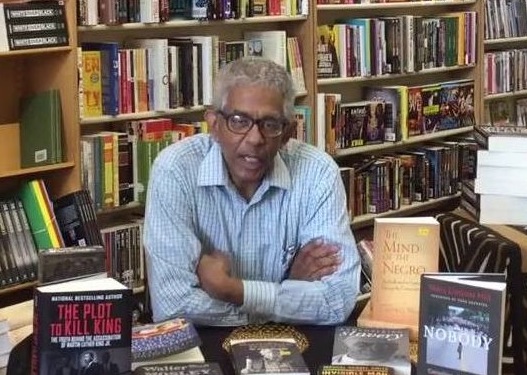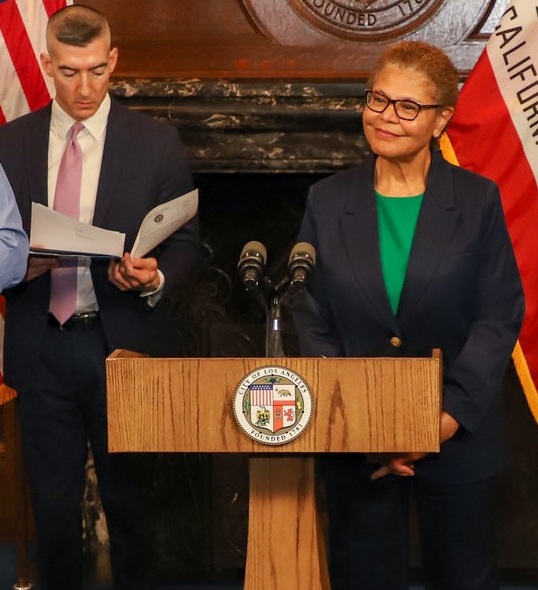By Janice Hayes Kyser
Contributing Writer
LEIMERT PARK — Residents, avid readers, authors and even competitors say the closing of Eso Won Books will mark the end of an era that leaves behind an indelible mark on Black culture in the city.
“It is heartbreaking news,” said Gina Fields, a Leimert Park resident and chair of the Empowerment Congress West Area Neighborhood Development Council. “They are an institution, a bastion of Black creativity and a haven for self-actualization. Eso Won gives voice to the voiceless. I will miss it tremendously and plan to spend as much time as I can there before they close their doors at the end of the year.”
Over more than three decades, Eso Won’s owners — James Fugate and Tom Hamilton — have weathered economic ups and downs, social revolutions and the move to online book sales. Yet, Fugate says “there comes a time when time catches up with you.” And for him and Hamilton, he says that time is now.
“We have been in the book business for more than three decades and frankly we are tired,” Fugate said. “Still, there is no doubt we will miss the community and they will miss us.”
Fugate and Hamilton founded the bookstore, which is one of the oldest independent Black bookstores in the country. Since opening their doors in 1989, they moved locations several times before settling for the long haul in historic Leimert Park Village.
The store’s name means water over rocks in the Ethiopian Amharic language. Dr. Randal Henry, a Los Angeles-based author, describes Eso Won as a place where Black creativity flows and is celebrated. He says he benefited from Eso Won’s promotion of his books online.
He is certainly not alone; countless Black authors have seen their works elevated by Eso Won including a young senator from Illinois, Barack Obama, Maya Angelou, Spike Lee, Ta-Nehisi Coates. Octavia Butler and Toni Morrison, who all held book signings at the store.
“Eso Won represents a mecca of Black people telling our story and that is invaluable,” said Henry, who is an expert on public health issues in L.A.’s historically Pan-African/Black communities and the founding CEO of Community Intelligence, an Afro-centric research and health policy consulting firm.
“We are a strong people and when one door closes, we open another,” said Henry, who is the author of two books on Los Angeles and its Black residents, including his latest work; “Born in South LA: 100+ Remarkable African Americans Who Were Born, Raised, Lived or Died in South LA.”
Jackie Ryan, owner of Zambezi Bazaar, an African-American clothing store and gift shop in Leimert Park, says the loss of Eso Won is impossible to calculate.
“As Black book sellers, James and Tom reached the pinnacle of success sharing with the Black community every inch of Black literature they curated for our people.”
“Thanks to them, my coffee table is overflowing with Black knowledge, pleasure and beauty, Ryan added. “Leimert Park Village has been thoroughly enriched by their commitment and presence. They have instituted a rich legacy for others to follow.
Malik Muhammad, owner of Malik Books with locations in Baldwin Hills Crenshaw Plaza and Culver City, agrees.
“I have nothing but love for them,” said Muhammad, adding that Eso Won’s owners inspired him to open his book store in 1990. “I am a benefactor of Eso Won. They have created a legacy in our community that will not be forgotten.
“I had a degree, but I didn’t have a knowledge of myself and my people,” Muhammad added. “The books I bought at Eso Won contributed to my spiritual awakening and enlightenment as well as that of many others.”
Knowing that Eso Won made a positive difference for generations has been enormously gratifying, Fugate said. He also takes pride in knowing he and his business partner were able to create a safe space for Black voices.
“We always tried to create a warm and welcoming environment for the community,” Fugate said. “We kept our word; we were there when we said we would be there and we tried to help uplift everyone that we encountered. We had some very meaningful and deep conversations about Black literature and art over the years and made many friends along the way.”










